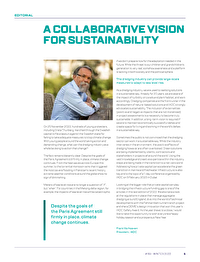On 25 November 2022, hundreds of young protesters, including Greta Thunberg, marched through the Swedish capital to file a lawsuit against the Swedish state for failing to take adequate measures to stop climate change. With young people around the world taking action and demanding change, what can the dredging industry as a whole be doing to action that change?
The fact remains blatantly clear. Despite the goals of the Paris Agreement still firmly in place, climate change continues. From the heat waves across Europe this summer, to the torrential monsoon rains that triggered the most severe flooding in Pakistan’s recent history, extreme weather conditions around the globe show no sign of diminishing.
Meters of sea level rise are no longer a question of “if”, but “when”. For countries in the Mekong delta region, for example, the impacts of sea level rise will be catastrophic if we don’t prepare now for the adaptation needed in the future. While the threat to our children and grandchildren’s generation is very real, somehow awareness and a platform is lacking in both society and the political sphere.
The dredging industry can provide large-scale measures to adapt to sea level rise.
As a dredging industry, we are used to realising solutions in a sustainable way. Already for 20 years, we are aware of the impact of turbidity on corals and plant habitat, and work accordingly. Dredging companies are the frontrunner in the development of nature-based solutions and IADC strongly advocates sustainability. The inclusion of externalities (positive and negative impacts that are not monetised) in project assessments is a necessity to become truly sustainable. In addition, a long-term vision is required if we are to maintain economically successful deltas and create space for living and working in the world’s deltas in a sustainable way.
Sometimes the public is not convinced that the dredging sector can work in a sustainable way. While the industry intervenes in the environment, the positive effects of dredging however are often overlooked. Green solutions are being implemented by clients, contractors and stakeholders in projects all around the world. Using the vast knowledge and creative expertise within the industry, steps are being made in the transition to a net-zero world. Addressing how private capital can accelerate the green transition in marine and freshwater infrastructure is also key and is the topic of a 1-day conference organised by IADC on 9 February 2023 in Dubai.
Looking at the bigger role that private capital can play in bridging the infrastructure funding gap is one of the articles in this last edition of 2022. We also take a look at the regulations in place that manage aggregate dredging around England, dive into the world of technical developments with the Fehmarnbelt tunnel trench project and share DEME’s design innovation that won this year’s IADC Safety Award. As the year draws to a close, I would like to take this opportunity to wish everyone a happy holiday season and a prosperous New Year.















